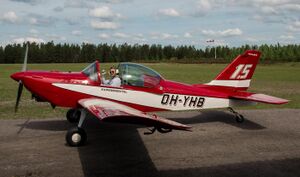Engineering:PIK-15
From HandWiki
Short description: Finnish light aircraft
| PIK-15 Hinu | |
|---|---|

| |
| Role | Glider tug |
| National origin | Finland |
| Manufacturer | Polyteknikkojen Ilmailukerho |
| Designer | Kai Mellen, Ilkka Lounamaa and Jussi Rinta |
| First flight | 29 August 1964 |
| Number built | 7 |
The PIK-15 Hinu is a light aircraft developed in Finland in the 1960s for use as a glider tug.[1] It was a low-wing cantilever monoplane of conventional design with an enclosed cockpit and fixed, tailwheel undercarriage.[2] The cockpit had two seats, side-by-side, and the PIK-15 was intended to have a secondary role as a trainer.[1] Construction was of wood throughout.[3]
Design work began in 1960, with the first prototype built two years later and flying on 29 August 1964.[2] Six examples were listed on the Finnish Civil Aviation Authority registry in 2011.[4]
Specifications (prototype, with low-pitch propeller)
Data from Jane's All the World's Aircraft 1965–66[5]
General characteristics
- Crew: 1
- Capacity: 1 passenger or instructor
- Length: 6.60 m (21 ft 8 in)
- Wingspan: 10.00 m (32 ft 10 in)
- Height: 2.03 m (6 ft 8 in)
- Wing area: 14.0 m2 (151 sq ft)
- Aspect ratio: 7.15:1
- Airfoil: NACA 2415 at root, NACA 4409R at tip
- Empty weight: 493 kg (1,087 lb)
- Max takeoff weight: 765 kg (1,687 lb)
- Fuel capacity: 110 L (24 imp gal; 29 US gal)
- Powerplant: 1 × Lycoming O-320-A2B air-cooled flat-four, 110 kW (150 hp)
Performance
- Maximum speed: 190 km/h (120 mph, 100 kn)
- Cruise speed: 170 km/h (110 mph, 92 kn)
- Stall speed: 81 km/h (50 mph, 44 kn) (flaps down)
- Never exceed speed: 300 km/h (190 mph, 160 kn)
- Rate of climb: 7.0 m/s (1,380 ft/min)
- Take off run to 15 m (50 ft): 150 m (492 ft)
- Landing run from 15 m (50 ft): 150 m (492 ft)
Notes
References
- "PIK-15 HINU '2000+'". Porin Ilmailukerho website. http://www.kolumbus.fi/porinik/Pik15/Pik15pic.htm.
- "PIK-sarjan lentokoneet". Polyteknikkojen Ilmailukerho website. http://pik.tky.fi/joomla/index.php?option=com_content&task=view&id=43&Itemid=108.
- "Summary of the Finnish Aircraft Register 2008". Finnish Civil Aviation Authority website. http://www.civilaviationauthority.fi/files/lth/Ilma-alukset/Rekisteri2008.pdf.
- "Summary of the Finnish Aircraft Register 2011". Finnish Civil Aviation Authority website. http://www.ilmailuhallinto.fi/files/lth/Ilma-alukset/Rekisteri_1_1_2011.pdf.
- Taylor, John W. R. (1965). Jane's All the Worlds's Aircraft 1965–66. London: Sampson Low, Marston & Company.
- Taylor, Michael J. H. (1989). Jane's Encyclopedia of Aviation. London: Studio Editions.
 |

